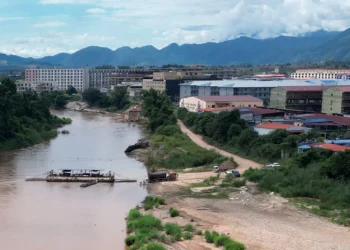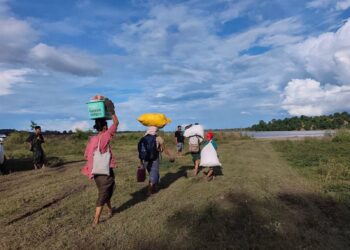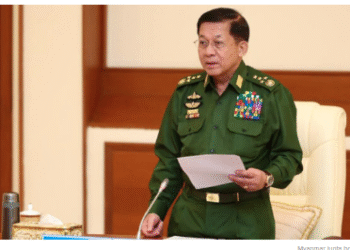OPINION
The swift delivery of aid to survivors of the recent earthquake must take precedence over transient political gains in a long-running conflict.
By NYI NYI KYAW | FRONTIER
The struggle known as the Spring Revolution seeks to replace military rule in Myanmar with democracy, federalism and justice. The sacrifices made by so many for this cause have been deeply humbling and deserve global recognition. Yet, a lack of humanity from some within the movement has surfaced repeatedly since the 2021 coup – mostly recently in the wake of the devastating, once-in-a-century earthquake that hit central Myanmar on March 28.
This has been evident firstly in the words of several Myanmar diaspora fundraisers and campaigners, regarding the dilemma they face between supporting the armed resistance and providing humanitarian aid to the earthquake’s victims. It has also surfaced in the disdainful and even celebratory tone of many Myanmar social media users and some news outlets in response to the deaths and injuries of civil servants in Nay Pyi Taw during the earthquake.
The attitude behind this social media response, unfortunately, has deep roots in the Spring Revolution. From its inception, many of the movement’s leaders and campaigners have divided the Myanmar people into two neat camps: those who support the junta, and therefore belong to the forces of a-dhamma (injustice), and those who oppose the regime, making them agents of dhamma (justice). You are generally conceived as being in one group or the other, with few shades of grey. This binary perspective has proven effective in mobilising people both online and offline, although often to the extent of justifying indiscriminate violence against those perceived – rightly or wrongly – as pro-military.
Pressure to join the resistance, or face public wrath and social ostracism, was especially intense in the early days of the movement. But more than four years on, people are largely still judged within this rigid framework. Public figures – including celebrities in the entertainment world, monks and other religious leaders, and high-profile charitable figures – remain particularly vulnerable to this form of social policing.
The greatest pressure, however, has been brought to bear on Myanmar’s civil servants. Public service in Myanmar has arguably not been so politicised since independence from the United Kingdom in 1948. People who quit their government jobs to join the Civil Disobedience Movement are rightly lauded as heroes, having sacrificed their financial and personal safety to undermine military rule. On the other hand, those who stayed in their jobs – even in service delivery roles – are often regarded as the lifeblood of the junta’s oppressive rule.
This black-and-white thinking is deeply problematic. Not all government roles involve oppression or matter much for the regime’s survival. “Non-CDM” civil servants also have families to feed, as well as security concerns that may prevent them from quitting their jobs. Yet, their portrayal as craven regime lackeys appears to have shaped the response on social media to reports of civil servants in Nay Pyi Taw being killed, injured or left homeless by the earthquake.
While many of the comments were cold or indifferent, others were openly derisive or even celebratory, saying the victims were reaping the consequences of their choice to work for the regime. These commentators should be reminded of one of several uncomfortable truths: non-CDM doctors and nurses at public hospitals in central Myanmar have treated thousands of patients injured in the earthquake.
Maintaining a balanced perspective amid Myanmar’s immense political and humanitarian challenges – many dating back decades – is easier said than done. Yet, it remains crucial to uphold our shared humanity and moral values.
Another area where this has been put to the test is the choice faced by fundraisers and donors over where to apportion limited funds.
Because the Spring Revolution has failed to secure overseas military assistance, the armed resistance remains largely crowdfunded. Most fundraising efforts are led by the Myanmar diaspora, including those long settled in wealthy countries such as the UK, United States and Australia, as well as more transient migrant workers and students in Singapore, Thailand, South Korea, Japan and elsewhere. They raise money for the resistance not only among themselves, but also from people within Myanmar. They have also responded quickly to the recent earthquake, commendably raising hundreds of thousands of dollars.
Sadly, though, with months of recovery work ahead, the fundraising momentum will inevitably slow. Hard choices will need to be made between supporting earthquake victims and resistance forces. Donor fatigue had already set in before the disaster, given the length of the anti-junta struggle, and this only sharpens the dilemma.
Several prominent fundraisers and celebrities have favoured prioritising the resistance. They say, both clearly and implicitly, that the earthquake is one of many crises Myanmar is bound to endure, and that the country can only be truly resilient once it is free from military control.
This perspective is understandable, given the ultimate importance of defeating the junta. However, an exclusive focus on military victory at the expense of suffering communities (many of whom have supported the resistance from the beginning) risks undermining values that ought to be central to the Spring Revolution.
The provision of earthquake aid itself meanwhile is being politicised to a troubling degree. The National Unity Government, formed by elected lawmakers ousted in the coup, and several ethnic armed organisations have warned about the military junta’s capacity to weaponise aid, and have urged the international community to instead deliver assistance through resistance channels.
Yet, the regime appears to control most of the worst-hit areas, putting them largely beyond the reach of resistance forces. The choice is also not binary: much of the aid so far has been successfully provided by small, independent groups of volunteers who, whatever their personal sympathies, are not acting under any political banner. Providing quake-stricken communities with urgent medical care and survival rations should take precedence over the advantages gained by either side of the war, which are likely to be marginal and transient amid such a protracted struggle.
The junta will, no doubt, take whatever advantage it can of the earthquake response, but the Spring Revolution was born to do better than the regime. The movement’s leaders should call out the callousness exhibited by some of its supporters, and remember that a military victory at the expense of humanity is no victory at all.
Nyi Nyi Kyaw is a Marie Curie Fellow in the School of Politics, Sociology and International Studies at the University of Bristol in the United Kingdom. The views expressed here are his own.






